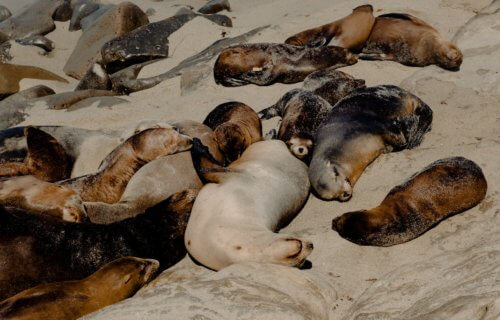SAUSALITO, Calif. — More and more sea lions native to California are developing and eventually dying from cancer. The reason why? Environmental toxins in their living environment. However, this disturbing trend isn’t just relevant to these seafaring mammals. Researchers from The Marine Mammal Center say if pollutants and contaminants continue to fill the California ecosystem, it’s only a matter of time before viral cancer rates among humans rise as well.
This conclusion is the result of over 20 years-worth of research and examinations of close to 400 sea lion cancer patients. Viral-caused cancer was first detected in a sea lion back in 1979. Since then, 18 to 23 percent of all adult sea lions cared for by The Marine Mammal Center for such cancers have passed away. That’s the single highest mortality rate for any one type of cancer among any mammal group – including humans.
“This paper’s conclusions mark a significant milestone in piecing together the complicated puzzle of cancer development in California sea lions,” says Dr. Pádraig Duignan, Chief Pathologist at The Marine Mammal Center and co-author of the study, in a media release. “The decades of research looking into this deadly disease clearly shows the ocean environment we all share is in trouble and that we need to find solutions to protect our collective health.”
Sea lion environments are polluting their bodies
Researchers also take no pleasure in reporting that local sea lions show some of the highest levels ever recorded of certain persistent organic pollutants within their blubber (body fat).
“Even though some of the pollutants we’re finding in the blubber have been out of use for years, these cancer-causing elements remain in the environment for a very long time and wreak havoc on opportunistic coastal feeders like sea lions,” Dr. Duignan explains. “It concerns me knowing that we consume very similar seafood as these cancer victims and that the ocean is raising a loud and clear alarm in the sick bodies of a sentinel species. We need to continue this critical research and collaborate with the human cancer doctors to find patterns to help discover the link between sea lions and ourselves.”
An earlier project discovered that sea lions with cancer carry a type of herpesvirus, similar to the one that causes a form of viral cancer (Kaposi’s sarcoma) in humans. This time, researchers used complex statistical analyses to more thoroughly investigate what leads to such aggressive cancers in marine animals.
Ultimately, the team discovered that sea lions with cancer have damaged DNA due to a number of factors like environmental pollutants and infections by tumor-promoting viruses such as Otarine herpesvirus-1. Surprisingly, individual genetics don’t seem to make much of an impact either way.
“While there is more to be learned about the complex factors that play into the development of this disease, what we learn from these animals contributes to research that underpins the threat to human health from pollutants in the ocean,” concludes lead study author Dr. Frances M. D. Gulland.
The study is published in Frontiers in Marine Science.
